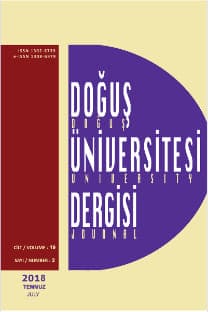William Wordsworth's 'Double A Wareness' of Memory in Virginia Woolf's MRS Dalloway
William Wordsworth'un 'Hatıranın Çift Yönlü Algılaması' Kavramının Virgina Woolf'un MRS Dalloway Adlı Romanındaki Kullanımı
___
ABRAMS, M.H. (1984). Structure and style. The Correspondent breeze : essays on English romanticism. M. H. ABRAMS (ed), New York, Norton.BEEDE, M. (1959). Virginia Woolf : romantic. North Dakota Quarterly, 27, pp. 21-29.
BEJA, M. (1970). Matches struck in the dark : Virginia Woolf's moments of vision. Virginia Woolf : to the lighthouse : a selection of critical essays. In: M. BEJA (ed), Basingstoke, Macmillan.
BENNET, J. (1964). Virginia Woolf : her art as a novelist. Cambridge, Cambridge University Press.
BLACKSTONE, B. (1949). Virginia Woolf : a commentary. New York, Harcourt.
BRADBURY, M. (1973). Possibilities : essays on the state of the novel. Oxford, Oxford University Press. and MCFARLANE, J. eds. (1991). The name and nature of modernism. Modernism : a guide to European literature 1890-1930. Harmondsworth:Penguin.
BROWN, N. (1984). The 'Double Soul' : Virginia Woolf, Shelley, and Androgyny. Keats-Shelley Journal, 33, pp. 182-204.
BROWN, D. (1989). The modernist self in Twentieth-century English literature : a study in self-fragmentation. Basingstoke, Macmillan.
BURLING, J. B. (1984). Virginia Woolf's 'Lighthouse' : an Allusion to Shelley's Queen Mab?. English Language Notes, 22, pp. 62-65.
DAICHES, D. (1963). Virginia Woolf. New York, New Direction.
EDEL, L. (1971). The novel as poem. Virginia Woolf : a collection of critical essays. C. SPRAGUE (ed), Englewood Cliffs, Prentice-Hall.
FAULKNER, P. (1977). Modernism, London, Methuen.
FLETCHER, J. & BRADBURY, M. (1991). The introverted novel. Modernism : a guide to European literature 1890-1930, M. BRADBURY & J. MCFARLANE (eds), Harmondsworth, Penguin.
FLEISHMAN, A. (1975). Virginia Woolf : a critical reading. Baltimore, Johns Hopkins University Press.
FORSTER, E. M. (1971). Virginia Woolf. Virginia Woolf : a collected essays, C. SPRAGUE (ed), Englewood Cliffs, Prentice-Hall.
FREEDMAN, R. (1966). The lyrical novel : studies in Hermann Hesse, Andre Gide, and Virginia Woolf. Princeton, Princeton University Press.
FREEDMAN, R. (1980). Virginia Woolf : revaluation and continuity. California : University of California Press.
FRIEDMAN, S. S. (1989). Lyric subversion of narrative in Women's writing : Virginia Woolf and the Tyranny of Plot. Reading narrative: form, ethics, ideology. J. PHELAN (ed), Columbus, Ohio State University Press.
FRIEDMAN, M. J. (1991). The symbolist novel : Huysmans to Malraux. Modernism: a guide to European literature 1890-1930, M. BRADBURY & J. MCFARLANE (eds), Harmondsworth, Penguin.
KEMP, S. (1990). But how describe a world seen without a self? Feminism, fiction and modernism. Critical Quarterly, 32, pp. 99-118.
MAJUMDAR, R. & MCLAURIN, A., eds. (1975). Virginia Woolf : the critical Heritage. London, Routledge & Kegan Paul.
MAITLAND, F. W. (1906). The life and letters of Leslie Stephen. London, Duckworth & Co.
MCGAVRAN, J. H. (1981). Alone seeking the visible world : the Wordsworths, Virginia Woolf, and the waves. Modern Language Quarterly, 42, pp. 265-91.
MUIR, E. (1975). Virginia Woolf. Virginia Woolf : the critical Heritage, R.
MAJUMDAR & A. MCLAURIN (eds), London, Routledge & Kegan Paul.
PHILIPSON, M. (1974). Mrs Dalloway : what's sense of your practices?. Critical Inquary, 1, pp. 138-45.
PYKETT, L. (1995). Engendering fictions : the English novel in the early Twentieth Century. London : Edward Arnold.
SCHUNG, C. (1979). The romantic genesis of the modern novel. Pittsburgh, University of Pittsburgh Press.
TROY, W. (1970). Virginia Woolf and the novel of sensibility. Virginia Woolf : to the lighthouse : a selection of critical essays, M. BEJA (ed), Basingstoke, Macmillan.
VLASCOPOLOS, A. (1986). Shelley's triumph of death in Virginia Woolf's voyage out. Modern Language Quarterly, 47, pp. 130-153.
WOOLF, V. (1948). Modern fiction. The common reader : the first series. London, The Hogarth Press.
WOOLF, V. The humane art. Collected Essays, vol. 1, London, The Hogarth Press.
WOOLF, V. (1966). How should one read a book?. Collected Essays, vol. 2, London,The Hogarth Press.
WOOLF, V. (1967). A letter to a young poet. Collected essays, vol. 2, London, The Hogarth Press.
WOOLF, V. (1967). The narrow bridge of art. Collected essays. vol. 2, London, The Hogarth Press.
WOOLF, V. (1968). The years. Harmondsworth, Penguin.
WOOLF, V. (1975). Wordsworth and the Lakes. The flight of the mind : the letters of Virginia Woolf 1888-1912. N. NICOLSON & J. TRAUTMANN (eds), vol. 1, London, The Hogarth Press.
WOOLF, V. (1976). Moments of being : unpublished autobiographical writings, J. SCHULKIND (ed), Brighton, Sussex University Press.
WOOLF, V. (1979). The sickle side of the moon : the letters of Virginia Woolf 1932-35, N. NICOLSON & J. TRAUTMANN (eds), vol. 5, London, The Hogarth Press.
WOOLF, V. (1980). Mrs Dalloway. London, Granada.
WOOLF, V. (1980). The Diary of Virginia Woolf 1925-30, A.O. BELL & A. McNEILLIE (eds), Vol. 3, Harmondsworth, Penguin.
WOOLF, V. (1992). A room of one's own - three guineas, M. SHIACH (ed), Oxford, Oxford University.
WOOLF, V. (1993). The portrait of Leslie Stephen. Virginia Woolf : to the lighthouse : a selection of critical essays, M. BEJA (ed), London, Macmillan.
WOOLF, V. (1994). Four great novels : Jabob's room, Mrs Dalloway, To the Lighthouse, The Waves. Oxford, Oxford University Press.
WORDSWORTH, W. (1987). Wordsworth : poetical works. T. HUTCHINSON & E. de SELINCOURT (eds), Oxford, Oxford University Press.
- ISSN: 1302-6739
- Yayın Aralığı: 2
- Başlangıç: 2000
- Yayıncı: Doğuş Üniversitesi
Modeling Automated Guided Vehicle Systems in Material Handling
Türkiye'de Enflasyon-Büyüme İlişkisi: Zaman Serisi Analizi
Regresyon Denkleminin Başarısını Ölçmede Kullanılan Belirleme Katsayısı ve Kritiği
William Wordsworth's 'Double A Wareness' of Memory in Virginia Woolf's MRS Dalloway
REGRESYON DENKLEMİNİN BAARISINI ÖLÇMEDE KULLANILAN BELİRLEME KATSAYISI VE KRİTİĞİ
Türkiye'de İktisadi Planlama: DPT'ye İhtiyaç Var mı?
Para-Sermayenin Yeniden Yapılandırılması: Türk Özel Bankacılık Sektörü Örneği
